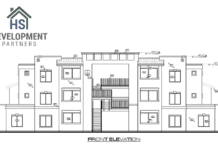
The Sedona City Council has discussed the progress of bills through the Arizona State Legislature during multiple council meetings over the last few months.
The city’s legislative priorities are not receiving much support from the state legislature this session, as city lobbyist Kathy Senseman informed the City Council on Feb. 11 that the House of Representatives was not planning to advance any bills dealing with short-term rentals, citing property rights issues.
Feb. 10 was the last day to file bills.
By Arizona law, the legislative session should end after 100 days, on Tuesday, April 22, but the Speaker of the House and Senate President may extend the session by a week or more by a majority vote of both chambers. Arizona lawmakers must pass a state budget by June 30, before the start of the fiscal year.
During discussion of city staff’s recommended legislative priorities, Senseman said that the governor’s proposed budget was “met with a lot of hostility by the Republicans in the legislature” due to its three-year projections, which the Republican caucus estimates will put the budget $800 million out of balance by the third year, while state agencies have already requested $340 million in supplemental funding above the proposed budget.
“[Senate] President [Warren] Petersen has said, ‘Look, if we can’t get consensus with the governor on certain bills, certain issues, that she’s continually vetoed, then we’re just going to start referring them to the ballot,’” Senseman said. “These ballot referrals are, in my opinion, dangerous.”
Prior to his review of staff’s positions on various bills for council approval, City Attorney Kurt Christianson noted that a total of 1,801 bills, resolutions and memorials had been introduced this session.
Council Support
This session, council expressed support for staff’s recommendation to support:
HB2303, introduced by Rep. Selina Bliss [R-District 1], who represents Sedona, which would allow small cities or towns with slow population growth rates to submit their future general plans to the voters for approval if their extant general plans were approved by the voters; since Sedona’s current general plan, the Sedona Community Plan, was approved by City Council on March 26, 2024, the bill would not affect Sedona.
HB2308, also introduced by Bliss, which would allow cities to impose both overall STR caps and caps on the number of STRs within designated areas, as well as requirements for minimum distances between STRs.
“In general in the past we’ve registered in support of just about every short-term rental bill,” Christianson said. “This year I think we might be a little more selective.”
“I had a meeting with the speaker and his staff last week,” Senseman said. “Basically, the chief of staff showed me the stack of bills and was pretty much like, ‘We’re not going to assign any of these. We’ll assign them at the very last day of session because we’re statutorily required to.’”
“We had a huge argument about private property rights,” Senseman added. “At one point [the chief of staff] shared that my arguments were Orwellian.”
HB2316, which would classify short-term rentals as commercial property for the purpose of taxation.
Senseman also recommended council support SB1609, which is an attempt by Sen. Mark Finchem [R-District 1] to repeal the legalization of STRs under SB1350 in 2016.
Christianson subsequently informed council on Feb. 25 that all three anti-STR bills had failed to pass out of committee.
Council Opposition
Council expressed support for staff’s choice to oppose additional bills:
- HB1517 would increase the weight limit for off-highway vehicles from 2,500 to 3,500 pounds. Christianson said March 11 that a floor amendment had removed the proposed increase.
- HB2222 would require gubernatorial and legislative review or approval of city and county settlement agreements worth more than $500,000. Christianson informed council on March 25 that this bill had been amended to require review of settlements only rather than approval.
- HB2317 would prohibit municipalities from regulating home design aesthetics or imposing different code requirements on prefabricated homes than on site-built homes.
- HB2319 would prohibit municipalities from imposing any regulation on a single-family residential lot that would violate the First Amendment, limit the use of personal property, directly or indirectly prevent transfer of part or all of the lot or require any feature that the property owner does not want, in order “that the opportunity for each Arizona citizen to build a life for their family and pursue the American dream shall not be abridged by unreasonable municipal regulation and enforcement.” The act is referred to as the Arizona Property Owners’ Bill of Rights.
- HB2371 and its companion bill SB1229 would address obstacles to housing development by prohibiting municipalities from interfering with owners’ design choices, as well as prohibiting cities with more than 70,000 people from setting minimum lot sizes greater than 1,500 square feet or setbacks greater than five feet.
- HB2426 would require a city council to fill a vacancy within 30 days. Christianson informed council on March 11 that it had been amended to extend the time limit to 60 days.
- HCR2021 would send a proposed repeal of transaction privilege tax on food to the voters. Senseman described the proposal as “detrimental” to Arizona cities. Sedona does not impose a food tax. Christianson noted on March 25 that it had passed out of the Senate Finance Committee 7-0 and would go to the voters if approved by the Senate.
- SB1013 would prohibit municipalities or counties from raising assessments, fees or taxes without a two thirds vote by the governing body.
- SB1036 would allow private individuals to sue municipalities for election interference by municipal employees.
- SB1313 would prohibit municipalities from recommending the recycling of any product not destined to be repurposed into a new product.
- SB1353 would allow third-party review of building permits for single-family homes if a city does not approve or respond to the application within 15 working days.
Councilwoman Kathy Kinsella suggested opposing HB2221, which would cut state general fund revenue contributions to cities that reduce their police budgets. “We have opposed similar bills the last two years,” Christianson said.
Christianson recommended on Feb. 25 that the city oppose SB1228, which would place a moratorium on municipalities adopting new development regulations not related to safety through June 30, 2028. He also noted that HB2317 and HB2319 had not passed out of committee at that time.
In the Running
Other bills of potential interest to Sedona residents introduced during this session include:
- HB2016, attempting to abolish First Amendment protections for the confidentiality of religious confessions in situations involving child abuse. See also HB2070.
- HB2068, expanding documentation requirements for “assistance animals.”
- HB2159, prohibiting bump-fire devices on firearms.
- HB2179, imposing additional restrictions on marijuana advertising.
- HB2268, imposing additional fees on insurers to fund the purchase of rural firefighting equipment; the bill does not prohibit insurers from passing on these fees to those insured.
- HB2289, increasing Arizona’s minimum wage to $18 per hour.
- HB2378, shortening the time period preceding restoration of firearm rights for those convicted as juveniles.
- HB2411, permitting golf courses to allow golfers to bring their own alcohol onto a course.
- HB2416, establishing the right of any Arizona resident to challenge any unlawful act by a government official in a special court action.
- HB2431, repealing state preemption of local firearms regulation.
- HB2459, restricting strip searches by police.
- HB2512, expanding the definition of prohibited possessors of firearms.
- HB2528, raising the legal age for marriage to 18.
- HB2554, adding five new brand inspectors.
- HB2588, creating shall-issue hunting permits for use on private lands.
- HB2613, creating a task force to report on fire insurance rates.
- HB2619, banning “assault weapons.”
- HB2621, prohibiting private firearm sales.
- HB2707, prohibiting health care discrimination on the basis of vaccination status.
- HB2725, requiring schools to report to parents if their kids refuse to say the pledge of allegiance.
- HB2764, declaring “howdy” the official state greeting.
- HB2780, limiting land lords’ ability to terminate tenancies.
- HB2806, adopting the National Popular Vote Compact.
- HB2871, appropriating $10 million for research on medical applications of ibogaine, a classical psychedelic.
- HB2904, barring landlords from terminating leases for tenants who use marijuana.
- SB1004, banning the outdoor release of balloons by adults.
- SB1014, legalizing firearm suppressors.
- SB1062, establishing cryptocurrencies as legal tender.
- SB1196, extending partial recognition of First Amendment protections to student journalists.
- SB1227, providing funding for school cell phone bans.
- SB1290, banning juvenile possession of brass knuckles.
- SB1555, establishing the Arizona Psilocybin Advisory Board to license psychedelic therapy.
- SB1729, establishing a first-time homebuyer assistance program.





















